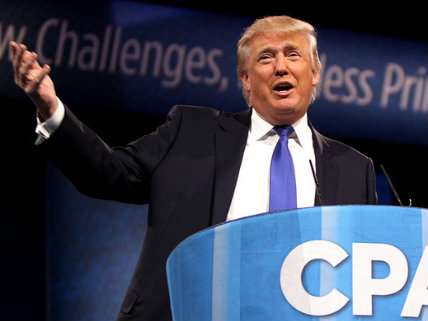Donald Trump's Week of Lies, Outrages, Broken Promises, and Shady Associations
The GOP candidate's bizarre but revealing counter-programing to the DNC.

As Democrats staged a convention to nominate Hillary Clinton as their presidential candidate, Republican rival Donald Trump offered some bizarre but revealing counterprogramming in the form of a week marked by lies, threats, outrages, reversals, hypocrisy, dubious associations, and broken promises.
On Wednesday morning, Trump's campaign manager, Paul Manafort, confirmed what many have long suspected: that despite Trump's promises over the last year or more to release his tax returns, he will become the first major party presidential candidate in four decades not to do so. Trump's flimsy excuse—that he is currently under audit—is one that didn't even stop Richard Nixon.
Later that morning, Trump held a press conference, where he appeared to invite a foreign power to intervene in the presidential election. "Russia, if you're listening, I hope you're able to find the 30,000 emails that are missing," Trump said, referring to the emails from Clinton's private email server that were not made public. "I think you will probably be rewarded mightily by our press." In a follow-up tweet, Trump repeated the invitation, but this time said the emails should be turned over to the F.B.I. The Clinton campaign accused Trump of encouraging "espionage."
A day later, Trump said he was merely being "sarcastic," but if so, his campaign aides didn't know it when he first made the remarks. As The New York Times notes, immediately following his initial statement, aides made "statements [insisting] that Mr. Trump was urging Russia to return any purloined property to the F.B.I."
At the same Wednesday press conference, Trump, who has repeatedly expressed admiration for Russian President Vladimir Putin, responded to questions about his personal ties to Russian president Vladimir Putin. "I have nothing to do with Putin," he said. "I've never spoken to him. I don't know anything about him other than he will respect me."
But Trump has repeatedly claimed to have met Putin before, and has even said he got to know him. In a November debate, Trump said "I got to know him very well because we were both on 60 Minutes. We were stablemates, and we did very well that night." And in 2014, as Mother Jones reported, Trump spoke at the National Press Club, where he said that he had recently been in Moscow, where he "spoke, indirectly and directly, with President Putin, who could not have been nicer, and we had a tremendous success." Either Trump has met Putin, or he hasn't; either way, he was lying on one of those occasions.
Wednesday evening, Trump participated in an Ask Me Anything on a Reddit forum devoted to his candidacy. Trump's handful of responses shed no real light on how he might govern. (One questioner asked whether Trump was tired of winning. Trump responded that he wasn't.)
But the venue revealed plenty. The particular subreddit that Trump chose to engage with has been described by Vice as having evolved from a conventional political discussion community to "an authoritarian one full of memes and in-jokes, far right talking points, coded racism, misogyny, homophobia, and Islamophobia, and a hypocritical 'free speech' rallying point." As an article at Slate noted, the particular questioners to which Trump responded have records of overtly racist, homophobic, and generally unpleasant online rhetoric. This was the online community that Trump—a major party presidential candidate—chose to engage with.
In one of the answers Trump gave on Reddit, he touted his "detailed plan for H-1B reform to protect American workers." Shortly afterwards, Buzzfeed reported that two of Trump's clubs in Florida, including the Mar-a-Lago Club in Palm Beach, where he has held multiple campaign events, were seeking to hire 78 immigrants to fill jobs for housekeepers, cooks, and servers. ("Getting help in Palm Beach during the season is almost impossible," Trump said last year.)
At the DNC, meanwhile, a wide array of speakers criticized Trump in fairly harsh terms. And at a Thursday rally, Trump responded to them too, without naming anyone in particular, saying that he would like to "hit a number of those speakers so hard, their heads would spin," so that "they'd never recover."
"I was going to hit one guy in particular, a very little guy," Trump said as the crowd laughed. "I was going to hit this guy so hard his head would spin, he wouldn't know what the hell happened." Trump sometimes uses the word "hit" to refer to a rhetorical attack, but he has also seemed to encourage violence at his campaign rallies before.
This is how the Republican nominee for president spent the days after his nominating convention.
For any other major political candidate in memory, a week like this would amount to a bizarre, catastrophic, campaign-destroying spectacle. For Donald Trump, it's just another week.


Show Comments (236)